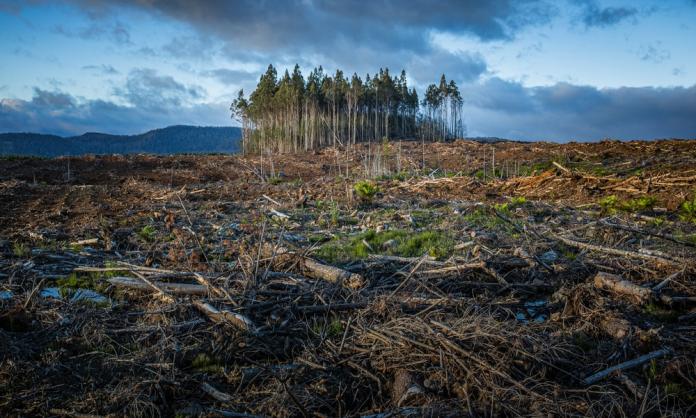This article is based on a speech given by Jerome Small, Victorian Socialists Northern Metro candidate in the upcoming state election, at the 30 July United Climate Rally in Melbourne.
Point number one is acknowledging whose land we’re on: the First Nations people, the Wurundjeri people and the entire Kulin nations, and the Aboriginal people around this state and around this country. More than 200 years ago, these First People had a social system imposed on them that turned land into a commodity, that turned human beings into a commodity, that turned everything in the world into a commodity to be bought and sold for a profit.
That social system decided very quickly that it was more profitable to run sheep on this part of the world than to let human beings live on it as they had always done. And the genocide ensued. That social system continues to decide that it’s more profitable to rip coal and gas from the ground than to let Aboriginal people live on their country. That dispossession continues to this day.
So it should be both an inspiration and an education for all of us that, despite everything that that social system has visited on First Nations people, they are still here and still fighting for justice. That should be a reminder to all of us that sometimes the very survival of people depends on resistance, depends on fighting, depends on organising.
That social system is still with us, of course, and still turning the planet and everything on it into a commodity, regardless of the consequences. Which gets to my second point—that capitalism has brought us to a dire situation.
We’ve heard about wildfires in countries, like the UK and Poland, that are not accustomed to seeing wildfires, due to the massive heatwave in Europe. We know a bit about this from the Australian bushfire summer of 2019-20. It’s not hard to find accounts of firefighters attempting to fight flames 70 metres tall. Next time you’re in the city, find a fifteen-storey building. That’s 70 metres, give or take. It’s terrifying. We’re talking about flames that high—in some cases twice as high, up to 150 metres.
That’s not the scariest thing, though. The scariest thing isn’t the 33 people who died from the flames that summer, or the 400 people who died from the smoke, or the 1 billion animals that died from the fire and the smoke and the after-effects. The scariest thing isn’t that 7 percent of New South Wales, an area bigger than several European countries, burned in that year.
The scariest thing is that, according to the Bureau of Meteorology and the CSIRO, that year of 2019—the hottest year ever recorded in Australia—will be the average temperature of a year in Australia once we get 1.5 degrees of global warming. All those flames, all that death, all that ash—they’re saying will be our average temperature.
And Labor is looking at 1.5 degrees out its rear vision mirror as it zooms past, on its planet-incinerating 43 percent target. This gets to my third point: Labor and fossil fuels.
It’s hard to picture the scale of the fossil fuel export projects that Labor is prepared to approve.
I went to the Latrobe Valley last week. As you enter the town of Morwell, you can see on your right-hand side a massive pit 100 metres deep and the size of the Melbourne CBD, all the way from Docklands through to the MCG. It was an open-cut coal mine that for 60 years fed Australia’s highest emitting power station, Hazelwood. The best estimate I’ve seen is that all of the coal fed into that power station produced 400 million tonnes of CO2. A huge contribution to global heating.
But the Scarborough gas project in Western Australia, which Labor is prepared to sign off on, will release 1.4 billion tonnes of CO2— three and a half times the amount that came from that enormous pit next to Morwell in the Latrobe Valley. Then there’s the Beetaloo project, which is a similar size—and that’s just the first of the massive gas fracking projects that Labor is prepared to endorse in the Northern Territory. Add Narrabri in NSW. Add Beach Energy down in the Otway Basin in Victoria. Thank you, Daniel Andrews, for your contribution to runaway heating.
That tells us everything we need to know about where we’re headed under Labor. They have no intention of interfering with a social system that turns everything into a commodity to be bought and sold for profit, regardless of consequences.
This gets me to the fourth point—what have we got going for us, in the face of all this? In my opinion, quite a bit.
We’ve got the huge majority of humanity who do not make billion-dollar profits from cooking the planet.
We’ve got many people in the Latrobe Valley. There’s a stereotype that the coal regions are wall to wall coal-loving blue-collar workers. That’s bullshit, and it’s an insult to say it. You go to the Latrobe Valley and, just like any other part of the country or the world, there’s a significant argument taking place. There are people in that community—and in those power stations, in fact—making arguments about the need to get out of fossil fuels as soon as possible. That’s something that we have going for us.
We’ve got the potential for mass movements like what the climate strikers showed us in 2019 around the world: some of the biggest protests that have happened in this town for a hell of a long time. We’ve got that going for us.
We’ve got civil disobedience going for us. Whether it’s Extinction Rebellion, whether it’s Blockade IMARC, whether it’s Blockade Australia, we’re going to need a shit ton more of that.
We’ve got the truth going for us—but the truth is never going to be enough. We need organisation to turn all of that into a mass movement.
One thing that we also need, if our movement is going to succeed, is radical politics. That is my final point. That’s something that a lot of people here from different perspectives share. And that’s something that the Victorian Socialists are very much building in the few months ahead in the election campaign.
Yes, we’ll be talking about reversing privatisations. Yes, we’ll be talking about zero-emissions electricity grids by 2030 and a zero-carbon economy by 2035—because I think that’s the only thing that we can be talking about if we’re serious about stopping the temperature rising far past 2019.
We’ll also be talking about a vision of a society that is not a social system that turns everything into a commodity to be bought and sold for a profit, even as the bodies pile high.
We’ll be talking about a vision of a society founded on solidarity and cooperation, which comes out of the struggles of today, and which doesn’t rely on billion-dollar corporations running our energy system and running the world. A society that says to those corporations: Do not pass go, do not collect $11.7 billion from the federal government this year. Your time is up. You’re done. Get out of the way.
You can take your 43 percent greenwashing target, you can take your coal and gas, and you can go to hell with them because we’re taking our world back. We’ll be talking about ordinary people making history over the next few months. And organising to do just that.









